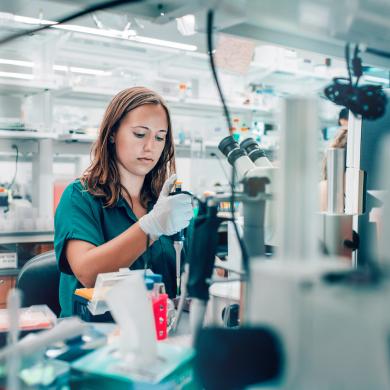
-
About
-
Apply
-
Benefits
-
Eligibility
-
Submission
-
Fellows
WTI Postdoctoral Fellowships support researchers who use experimental, computational, or theoretical methods to work across traditional disciplinary boundaries to investigate human cognition and explore human potential.
Wu Tsai Postdoctoral Fellows design innovative projects that expand their expertise beyond their doctoral training, supported by mentorship tailored to their interdisciplinary goals. All admitted Fellows benefit from structured programming, shared research facilities, internal research funding sources and opportunities, and other resources offered by the Institute, to advance their scientific training and professional development.
2025-26 Application
Status: CLOSED

Candidates are encouraged to reach out to any of the over 180 Wu Tsai Faculty Members. However, because faculty receive many such inquiries, the most successful outreach is sincere and specific, clearly indicating that the applicant has conducted their own advance research into potential areas of mutual interest related to the Institute's mission.
Successful applicants have demonstrated an interdisciplinary training plan through various approaches, including (but not limited to):
Co-mentoring across disciplines: Develop a co-mentoring team of two or more Wu Tsai Faculty Mentors from different disciplines, one of which may overlap with the applicant’s PhD field.
Transitioning to a new field: Work with a single Wu Tsai Faculty Mentor whose research area differs substantially from the applicant’s PhD (incremental transitions will not be considered).
Open-ended computational/theoretical projects: Collaborate flexibly with multiple research groups to investigate human cognition through computational theory, analysis, and modeling of neuroscience data and concepts.
Our Fellows are engaged interdisciplinary scientists, excited to bridge disciplines in the study of cognition and to foster inclusive environments for research.
Giovanna Guerrero-Medina, PhD, Assistant Director for Professional Development and Community
Benefits + Eligibility
- $80,000 annual salary, for up to three years
- Benefits as defined by Yale's Office of Postdoctoral Affairs (Postdoctoral Associate category)
- $2,000 in discretionary funds with opportunity to apply for additional internal funds
- Access to shared research facilities and high-performance computing
- Protected time and programmatic opportunities for professional development, skill development, and networking with a supportive cohort of peers
- Robust mentoring program to support career development, featuring mentoring committees, compacts, and training
Begin appointment on or before September 1, 2026
Agree to the Institute's Code of Conduct
Participate in WTI activities and devote effort toward professional development, service, and community-building (up to 10% of effort)
Submit an annual progress report
Follow all guidelines and requirements for postdocs at Yale
PhD degree or equivalent must be awarded by the beginning of the fellowship and within the last 3 years.
The fellowship is open to U.S. and non-U.S. citizens.
Because this fellowship is intended to build the number of researchers working in these areas at Yale, current members of the Yale community (including postdocs and PhD students) are not eligible to apply.
Fellows are selected by a faculty committee based on their interdisciplinary scientific goals and track record of scientific achievements, commitment to advancing diversity, equity, and inclusion, and ability to make meaningful contributions to the community.
Submission Process
All materials must be submitted online through Interfolio at apply.interfolio.com/174525.
Briefly describe your research interests, investigators, and resources you would like to work with, and your motivation for why you want to further the understanding of human cognition and explore human potential through interdisciplinary research. If you are proposing mentored research projects please name the Wu Tsai Faculty with whom you would work with and append email evidence (PDF) of the faculty member(s) declaring an interest in working with you.
Summarize prior research experiences, skills, and achievements. Describe your postdoctoral research interests and how they advance the WTI mission — to understand human cognition and explore human potential by sparking interdisciplinary inquiry. Explain how the envisioned research is interdisciplinary and how it will benefit from your expertise, as well as the resources and researchers at WTI (two pages, inclusive of figures but excluding references).
Wu Tsai Postdoctoral Fellows are driven to use their talents to make a positive difference in society and the world. They are also expected to contribute to the mentoring, outreach, and community-building efforts of the Institute. Please describe how you envision having a positive impact in the Institute and in society through your research, teaching, mentoring, or outreach. Share any past experiences that lend credence to your motivations and describe any skills or networks you plan to leverage.
One letter must be from your thesis advisor(s). The letters should address the quality, originality, and independence of your research and potential. Letters must also be received via Interfolio by the submission deadline; incomplete applications will not be reviewed.
Please provide a current CV, including papers that have been published, are in press, or deposited in a preprint server (e.g., bioRxiv or arXiv); do not list manuscripts in preparation.







